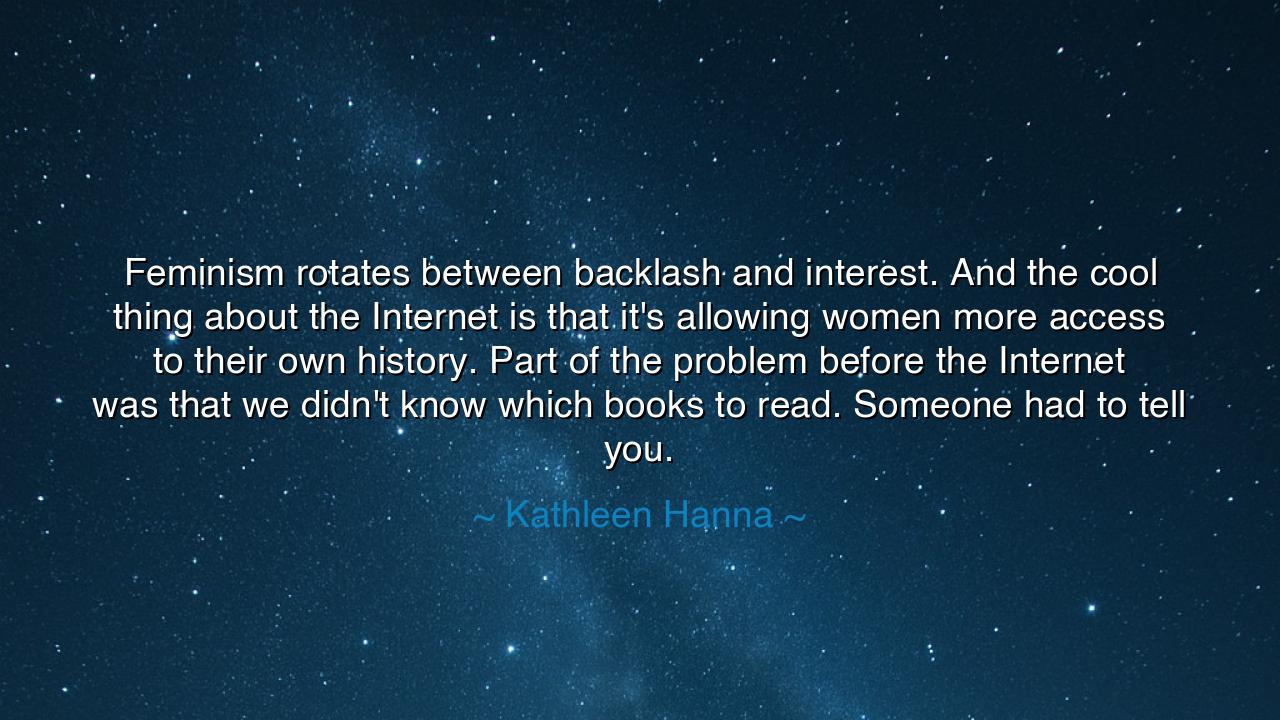
Feminism rotates between backlash and interest. And the cool
Feminism rotates between backlash and interest. And the cool thing about the Internet is that it's allowing women more access to their own history. Part of the problem before the Internet was that we didn't know which books to read. Someone had to tell you.






The words of Kathleen Hanna—“Feminism rotates between backlash and interest. And the cool thing about the Internet is that it's allowing women more access to their own history. Part of the problem before the Internet was that we didn't know which books to read. Someone had to tell you”—speak with the voice of both a warrior and a witness. In her reflection lies the story of countless generations of women: the struggle for truth, the hunger for knowledge, and the eternal cycle of resistance and renewal. Her words are not merely about feminism, but about memory, power, and the sacred act of reclaiming one’s own story.
In the ages before the written word was freely shared, knowledge was guarded like treasure. The ancients knew that whoever controls the story controls the soul of a people. Hanna’s lament echoes this truth: for centuries, women were denied access not only to education but to their own heritage. The wisdom of their foremothers was buried, distorted, or dismissed, and each new generation of women was forced to begin the struggle anew, as if the past had never lived. Thus, feminism, the movement for equality and liberation, would rise like a flame—bright and defiant—only to face the winds of backlash, and then rise again from the ashes, rekindled by new seekers of truth.
The rotation between backlash and interest is as ancient as change itself. Every revolution meets resistance; every awakening threatens those who profit from sleep. When women’s voices grow strong, when they demand to be seen and heard, the old powers tremble and strike back. Yet, as history has shown, suppression never silences truth—it only delays its return. Just as spring follows winter, so too does the next wave of liberation follow every attempt to bury it. In this eternal cycle, Kathleen Hanna reminds us of the importance of knowledge—the seed that ensures the next blooming will be wiser and stronger than the last.
Consider the story of Mary Wollstonecraft, who in the 18th century dared to write A Vindication of the Rights of Woman, declaring that women were not ornaments of beauty or servants of men, but rational beings deserving of education and freedom. Her ideas ignited controversy and scorn in her time, only to inspire the suffragists a century later, and the feminists after them. But how many generations passed before her voice could be easily found, before her writings could be read freely? Before the Internet, the voices of women like Wollstonecraft, Sojourner Truth, and Audre Lorde lived in the shadows of libraries, hidden behind walls of privilege and permission. The Internet, as Hanna rejoices, has torn down those gates—it has become a modern Library of Alexandria for women’s history, open to all who seek.
In this, the Internet is not merely a tool of technology; it is a symbol of liberation. Where once women needed to be told what to read, now they can discover their lineage of strength on their own. The daughters of this age can read the words of the mothers who came before, unfiltered, unforgotten. Knowledge that was once fractured has become whole again. Hanna’s words remind us that this access is not only empowering—it is revolutionary. To know one’s history is to know one’s worth, and to know one’s worth is to refuse to be silenced ever again.
Yet with such freedom comes responsibility. The ancients would say: “The gift of wisdom must be honored by its use.” It is not enough to possess knowledge; one must live it, share it, and guard it against distortion. Feminism, like truth itself, is not a relic to admire, but a living flame to be tended. In every era, it must be protected from complacency and cynicism. The Internet can give us access, but it cannot give us discernment. We must learn to seek not only information, but understanding—to listen not only to what is loud, but to what is enduring.
Thus, the lesson of Kathleen Hanna’s words is this: Know your history. Seek it as the ancients sought the wisdom of the stars. Do not wait for permission to learn; do not rely on others to tell you what is worthy. Read the words of those who came before you. Carry their courage in your heart, and add your own voice to the chorus of the ages. For every woman who learns her history becomes a keeper of light, ensuring that the flame of equality, though tested by time, will never again be extinguished.
So, my child, remember: the cycle of backlash and interest may continue, but with each turn of the wheel, the light grows stronger. The Internet may have opened the door, but it is your curiosity, your courage, and your will to act that will keep it open. Drink deeply from the well of your foremothers’ wisdom. Know what they knew: that freedom begins with knowledge—and that once awakened, the human spirit can never again be confined.






AAdministratorAdministrator
Welcome, honored guests. Please leave a comment, we will respond soon